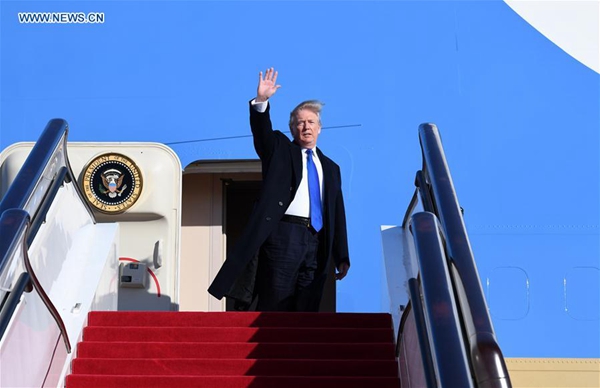Thoughts on the significance of Trump's visit to China
- By Eugene Clark
 0 Comment(s)
0 Comment(s) Print
Print E-mail China.org.cn, November 12, 2017
E-mail China.org.cn, November 12, 2017
 |
|
U.S. President Donald Trump leaves Beijing on Nov. 10, 2017, concluding his state visit to China. [Xinhua/Zhang Ling] |
President Trump's visit to China was highly successful and significant for many reasons. For a start, Trump's commitment of an extended trip to Asia, longer than any U.S. president in decades, is a sign of the importance he places in Asia.
One of his major priorities was peace in the region, especially in light of the nuclear threat from the DPRK. In this regard, the U.S. president stressed the importance for the world's nations to stick together and to use dialogue and economic pressure to bring about a peaceful solution.
President Trump mentioned that China's traditional relationship to and support of North Korea is the key to ensuring a peaceful resolution of this issue. According to him, if nations stand together threats will be resolved peacefully and to the benefit of all. This was coupled with Trump's earlier offer of a peaceful pathway to North Korea in his recent address made in South Korea.
It was also significant that President Trump was accompanied by 29 U.S. company CEOs. This led to signing trade deals worth over $250 billion -- a powerful example of the huge potential that exists when China and the U.S. work together. These deals included major contracts with Boeing (airplanes), Ford (electric vehicles) and General Electric (energy related infrastructure) and the sale of liquefied natural gas from Alaska.
On the issue of a trade imbalance, it was significant that both President Xi and President Trump emphasized the desirability of a reasonably balanced trade relationship, a level playing field and promotion of a win-win trading result for both countries. Indeed, the trade imbalance issue is far more nuanced than is usually portrayed. I am not an economist, but my understanding is that the imbalance focuses on the $350 billion (approx.) in China’s favor, but ignores a number of factors and the complexity of the U.S.-China economic relationship. Chinese firms do a lot of manufacturing for foreign countries, including the U.S. This results in lower costs for U.S. consumers and, in many cases, also enables the U.S. to add value to the assembled components.
Note also that in services trade the balance is in favor of the U.S. Nor does the trade deficit figure include U.S. companies operating in China selling goods back to the U.S. There is also the economic contribution to the U.S. economy gained from Chinese tourists and students attending schools in the U.S.
It can also be argued that as a matter of economics a trade imbalance is not necessarily a bad thing. It is impossible to have 100 plus countries in the world all in trade surplus with one another. Trade imbalances reflect changes in times and different prices in different goods and services.
Trade deficit figures alone also ignore the fact that U.S. investment in China is greater than China's investment in the U.S. A recent study report in the Wall Street Journal suggests the actual investments by China and the U.S. in each other's economy is much larger than reported -- a good reason why closer economic cooperation is strongly in the interests of both countries. Rather than focus on trade imbalances, the major focus should be on creating a more transparent and open economy in China and growing trade between China and the U.S. as well as globally.
In terms of geo-politics and world economics, President Xi pointed out that there is room enough in the Pacific to accommodate both China and the U.S. and the world community. Indeed, working together the two leading economies in the world can do much to grow the pie and enhance the prosperity of the larger world economy. President Xi committed to follow through on China's commitment to further open its economy and continue mutual support and dialogue in promoting conditions for greater economic development and world peace.
Perhaps most importantly, is the obvious positive chemistry which appears to exist between President Xi and President Trump and their family members. This visit follows a very warm mutual family relationship developed during President Xi’s visit to the U.S. early in Trump's first year of office. This relationship was further strengthened by the collegiality, friendship and mutual respect evident in this visit to Beijing. Such relationships help to nurture the trust and commitment to build on that relationship in the future.
Finally, the key now will be on achieving further positive and concrete outcomes for both China and the U.S. This includes an increasing number of U.S.-China business deals and transactions as seen this week in Beijing. On a government-to-government level we will hopefully see continued work, for example, cooperation in the WTO and the Bilateral Investment Treaty with U.S.
Eugene Clark is a columnist with China.org.cn. For more information please visit:
http://www.ccgp-fushun.com/opinion/eugeneclark.htm
Opinion articles reflect the views of their authors only, not necessarily those of China.org.cn.





